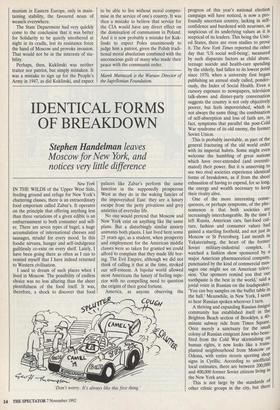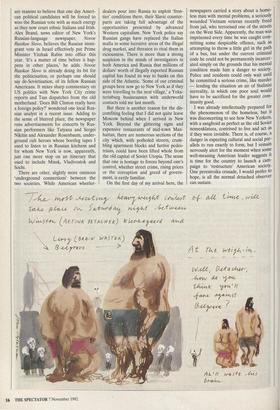IDENTICAL FORMS OF BREAKDOWN
Stephen Handelman leaves
Moscow for New York, and notices very little difference
New York IN THE WILDS of the Upper West Side, feeding ground and refuge for New York's chattering classes, there is an extraordinary food emporium called Zabar's. It operates on the principle that offering anything less than three variations of a given edible is an embarrassment to both consumer and sell- er. There are seven types of bagel, a huge accumulation of international cheeses and sausages, strudel for every mood. In this foodie nirvana, hunger and self-indulgence guiltlessly co-exist on every shelf. Lately, I have been going there as often as I can to remind myself that I have indeed returned to Western civilisation.
I used to dream of such places when I lived in Moscow. The possibility of endless choice was no less alluring than the sheer plentifulness of the food itself. It was, therefore, a shock to discover that food palaces like Zabar's perform the same function in the supposedly prosperous West as they do in the waking fancies of the impoverished East: they are a luxury escape from the petty privations and grey anxieties of everyday life.
No one would pretend that Moscow and New York exist on anything like the same plane. But a disturbingly similar anxiety animates both places. I last lived here some 25 years ago, as a student, when prosperity and employment for the American middle classes were so taken for granted we could afford to complain that they made life bor- ing. The Evil Empire, although we did not think of calling it that at the time, stroked our self-esteem. A bipolar world allowed most Americans the luxury of feeling supe- rior with no compelling need to question the origins of their good fortune.
America, as anyone observing the
'Don't worry. It's always like this first thing.'
progress of this year's national election campaign will have noticed, is now a pro- foundly uncertain country, lacking in self- confidence and burdened with neuroses, as suspicious of its underlying values as it is sceptical of its leaders. This being the Unit- ed States, there are even studies to prove it. The New York Times reported the other day that 'US social well-being', measured by such disparate factors as child abuse, teenage suicide and health-care spending by the elderly, had fallen to its lowest point since 1970, when a university first began publishing an annual study called, ponder- ously, the Index of Social Health. Even a cursory exposure to newspapers, television talk-shows and dinner-party conversation suggests the country is not only objectively poorer, but feels impoverished, which is not always the same thing; the combination of self-absorption and loss of faith are, in fact, symptoms that parallel the post-Cold War syndrome of its old enemy, the former Soviet Union.
This is probably inevitable, as part of the general fracturing of the old world order with its imperial hubris. Some might even welcome the humbling of great nations which have over-extended (and overesti- mated) their power. But it is unnerving to see two rival societies experience identical forms of breakdown, as if from the sheer exhaustion of having to expend, for so long, the energy and wealth necessary to keep their rivalry alive.
One of the more interesting conse- quences, or perhaps symptoms, of the phe- nomenon is that both societies are increasingly interchangeable. By the time I left Russia, American cars, fast-food cul- ture, fashion and consumer values had gained a startling foothold, and not just in Moscow or St Petersburg. Last month in Yekaterinburg, the heart of the former Soviet military-industrial complex, I watched a fashion show sponsored by a major American pharmaceutical company, punctuated by the kind of commercial mes- sages one might see on American televi- sion. 'Our sponsors remind you that our toothpaste is the best in the world,' said a jovial voice in Russian on the loudspeaker. 'You can buy samples on the buffet table in the hall.' Meanwhile, in New York, I seem to hear Russian spoken wherever I turn.. , A thriving and expanding Russian emigre community has established itself in the Brighton Beach section of Brooklyn, a 40- minute subway ride from Times Square. Once merely a sanctuary for the small colony of Russian emigrant Jews who bene- fited from the Cold War skirmishing on human rights, it now looks like a trans- planted neighbourhood from Moscow or Odessa, with entire streets sporting shop signs in Cyrillic. According to unofficial local estimates, there are between 200,00.0 and 400,000 former Soviet citizens living In the New York area.
This is not large by the standards of other ethnic groups in the city, but there
are reasons to believe that one day Ameri- can political candidates will be forced to woo the Russian vote with as much energy as they now court ethnic Italians and Irish. Alex Brand, news editor of New York's Russian-language newspaper, Novoe Russkoe Slovo, believes the Russian immi- grant vote in Israel effectively put Prime Minister Yitzhak Rabin into office this year. 'It's a matter of time before it hap- pens in other places,' he adds. Novoe Russ/we Slovo is already doing its bit for the politicisation, or perhaps one should say de-Sovietisation, of its fellow Russian Americans. It mixes sharp commentary on US politics with New York City crime reports and Tass dispatches from the old motherland. 'Does Bill Clinton really have a foreign policy?' wondered one local Rus- sian analyst in a recent issue. Adding to the sense of blurred place, the newspaper runs advertisements for concerts by Rus- sian performers like Tatyana and Sergei Nikitin and Alexander Rosenbaum, under- ground cult heroes whose bootleg tapes I used to listen to in Russian kitchens and for whom New York is now, apparently, just one more stop on an itinerary that used to include Minsk, Vladivostok and Sochi.
There are other, slightly more ominous 'underground connections' between the two societies. While American wheeler-
dealers pour into Russia to exploit 'fron- tier' conditions there, their Slavic counter- parts are taking full advantage of the opportunities presented by advanced Western capitalism. New York police say Russian gangs have replaced the Italian mafia in some lucrative areas of the illegal drug market, and threaten to rival them in viciousness. There is more than a strong suspicion in the minds of investigators in both America and Russia that millions of dollars' worth of illegally exported Russian capital has found its way to banks on this side of the Atlantic. 'Some of our criminal groups here now go to New York as if they were travelling to the next village,' a Yeka- terinburg businessmen with underworld contacts told me last month.
But there is another reason for the dis- comfiting feeling that I did not quite leave Moscow behind when I arrived in New York. Beyond the glittering signs and expensive restaurants of mid-town Man- hattan, there are numerous sections of the city which, with potholed streets, crum- bling apartment blocks and furtive pedes- trians, could have been lifted whole from the old capital of Soviet Utopia. The sense that one is hostage to forces beyond one's control, whether street crime, rising prices or the corruption and greed of govern- ment, is eerily familiar.
On the first day of my arrival here, the newspapers carried a story about a home- less man with mental problems, a seriously wounded Vietnam veteran recently freed from jail, who terrorised one of the streets on the West Side. Apparently, the man was imprisoned every time he was caught com- mitting some despicable offence, such as attempting to throw a little girl in the path of a bus, but under the current criminal code he could not be permanently incarcer- ated simply on the grounds that his mental condition made him a danger to society. Police and residents could only wait until he committed a serious crime, like murder — lending the situation an air of Stalinist surreality, in which one poor soul would have to be sacrificed for the greater com- munity good.
I was already intellectually prepared for the phenomenon of the homeless, but it was disconcerting to see how New Yorkers, with a sangfroid as perfect as the old Soviet nomenklatura, contrived to live and act as if they were invisible. There is, of course, a danger in expecting cultural and social par- allels to run exactly to form, but I remain nervously alert for the moment when some well-meaning American leader suggests it is time for the country to launch a cam- paign to 'restructure' American society. One perestroika crusade, I would prefer to hope, is all the normal detached observer can sustain.











































































 Previous page
Previous page